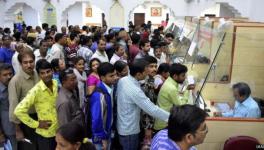COVID-19: Over 5 Lakh People in India Missed or Delayed TB Diagnosis in 2020

Image Courtesy: Picpedia
New Delhi: Over five lakh people in India are estimated to have had a missed or delayed tuberculosis diagnosis in 2020 due to the disruptions caused by the COVID-19 pandemic, according to a study.
The researchers found that over 1.5 million people in 45 high-burden countries had a missed or delayed tuberculosis diagnosis in the first year of the pandemic.
The study, published in the journal BMC Medicine, shows that children may be disproportionately affected in over half of countries analysed, those aged 65 or over in more than two thirds of countries, with sex being a risk factor in almost half of countries.
The team, including researchers from the London School of Hygiene & Tropical Medicine (LSHTM), UK, noted that vulnerable populations in high-burden countries worldwide must be prioritised in efforts to reduce the impact of the COVID-19 pandemic on tuberculosis (TB) care.
For India, they found that 50,454 children (less than 15 years old), 425,326 (over 4.2 lakh) adults aged 15-64 years, and 52,970 people above 65 years of age had a missed or delayed diagnosis. This included 309,477 (over 3 lakh) men and 170,514 (over 1.7 lakh) women above 15 years of age.
"We found strong evidence that the risk of being missed or delayed was higher for both children and the elderly than adults; 45 per cent higher for children and 12 per cent higher for the elderly," study joint lead author Finn McQuaid, from LSHTM, told PTI.
"Our results show that in many countries those who already faced the most difficulty in obtaining TB diagnosis and care have suffered worsening access as a result of the pandemic," McQuaid said.
The researchers modelled trends in TB case reporting to the World Health Organisation (WHO) for 45 high-burden countries between 2013 and 2019. Predictions for 2020 using these models were then compared to actual observations in the same year.
As many as 195,449 (nearly two lakh) children below the age of 15 years, 1,126,133 (over 11.2 lakh) adults aged 15 to 64 years old and 235,402 (2.3 lakh) older individuals aged 65 years or older had a missed or delayed diagnosis of TB in 2020, they said.
These figures include 511,546 (5.1 lakh) women and 863,916 (8.6 lakh) men, they said.
Although the study found no evidence for systemic disparity in risk by age or sex on a global scale, when broken down by country, setting-specific inequalities were revealed.
For example, in over half of countries (57.1 per cent) analysed, children were at a greater risk of having their TB diagnosis delayed or missed due to COVID-19 than adults, the researchers said.
In almost half of countries, sex was predicted to be an influential risk factor. Men, for example, were found to be particularly susceptible to missed or delayed diagnoses in the WHO region of the Americas (namely Peru and Brazil), they said.
These results suggest that the pandemic may have resulted in high numbers of individuals with TB being left untreated and unknowingly spreading infection, with long-term public health ramifications.
"While we look to build back and mitigate the impact COVID-19 has had on those with TB, it's vital that we focus on those most in need; not just out of a duty to address these inequalities, but to have any hope of ending TB,"McQuaid said.
Despite being responsible for the second largest number of deaths from an infectious disease worldwide, detection rates for cases of TB are low with inequalities in burden and access to care, notably for men, older individuals and children, the researchers said.
Until now, investigations into disruptions to TB patient care caused by COVID-19 have focused on the overall impact of the pandemic, with little consideration for the effect of potential inequalities, such as those related to age or sex, they said.
The latest findings may provide vital guidance as to major areas that should be targeted by policy makers to reduce the impacts of the pandemic on global TB burden to ensuring equitable patient care.
Get the latest reports & analysis with people's perspective on Protests, movements & deep analytical videos, discussions of the current affairs in your Telegram app. Subscribe to NewsClick's Telegram channel & get Real-Time updates on stories, as they get published on our website.
























